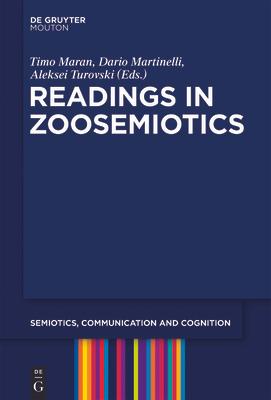The book is the first annotated reader to focus specifically on the discipline of zoosemiotics. Zoosemiotics can be defined today as the study of signification, communication and representation within and across animal species. The name for the field was proposed in 1963 by the American semiotician Thomas A. Sebeok. He also established the framework for the paradigm by finding and tightening connections to predecessors, describing terminology, developing methodology and setting directions for possible future studies.
The volume includes a wide selection of original texts accompanied by editorial introductions. An extensive opening introduction discusses the place of zoosemiotics among other sciences as well as its inner dimensions; the understanding of the concept of communication in zoosemiotics, the heritage of biologist Jakob v. Uexkll; contemporary developments in zoosemiotics and other issues. Chapter introductions discuss the background of the authors and selected texts, as well as other relevant texts.
The selected texts cover a wide range of topics, such as semiotic constitution of nature, cognitive capabilities of animals, typology of animal expression and many other issues. The roots of zoosemiotics can be traced back to the works of David Hume and John Locke. Great emphasis is placed on the heritage of Thomas A. Sebeok, and a total of four of his essays are included. The Reader also includes influential studies in animal communication (honey bee dance language, vervet monkey alarm calls) as well as theory elaborations by Gregory Bateson and others. The reader concludes with a section dedicated to contemporary research. Readings in Zoosemiotics is intended as a primary source of information about zoosemiotics, and also provides additional readings for students of cognitive ethology and animal communication studies.

Readings in Zoosemiotics
The book is the first annotated reader to focus specifically on the discipline of zoosemiotics. Zoosemiotics can be defined today as the study of signification, communication and representation within and across animal species. The name for the field was proposed in 1963 by the American semiotician Thomas A. Sebeok. He also established the framework for the paradigm by finding and tightening connections to predecessors, describing terminology, developing methodology and setting directions for possible future studies.
The volume includes a wide selection of original texts accompanied by editorial introductions. An extensive opening introduction discusses the place of zoosemiotics among other sciences as well as its inner dimensions; the understanding of the concept of communication in zoosemiotics, the heritage of biologist Jakob v. Uexkll; contemporary developments in zoosemiotics and other issues. Chapter introductions discuss the background of the authors and selected texts, as well as other relevant texts.
The selected texts cover a wide range of topics, such as semiotic constitution of nature, cognitive capabilities of animals, typology of animal expression and many other issues. The roots of zoosemiotics can be traced back to the works of David Hume and John Locke. Great emphasis is placed on the heritage of Thomas A. Sebeok, and a total of four of his essays are included. The Reader also includes influential studies in animal communication (honey bee dance language, vervet monkey alarm calls) as well as theory elaborations by Gregory Bateson and others. The reader concludes with a section dedicated to contemporary research. Readings in Zoosemiotics is intended as a primary source of information about zoosemiotics, and also provides additional readings for students of cognitive ethology and animal communication studies.